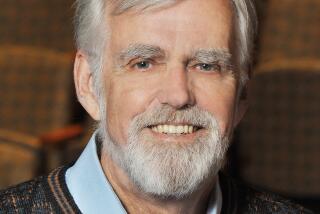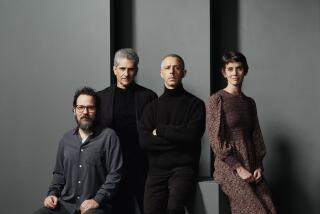Nancy Ebsen Finds Self Worlds Away From Winnetka
- Share via
When Nancy Ebsen was growing up in the early 1930s in Winnetka, Ill.--a plush northern suburb of Chicago--her mother used to take outings with some of her suburban women friends and their children at the Women’s Athletic Club in the city. When gossip time arrived, the children were sent off to do their own thing. For Nancy and her best buddy, that usually meant looking out for a girl three years younger named Nancy Davis, who was assigned to them by parental decree--and tended to cramp their style.
“She sort of tagged along,” says Nancy Ebsen today in her bay-front home on Balboa Island. “I would have been hard to convince then that she was going to grow up and be the wife of the President of the United States.”
Nancy Davis wasn’t the only public figure to emerge from the Winnetka of that period. Both Ann-Margret and Rock Hudson (he was known as Roy Fitzgerald then) followed Nancy Ebsen through Winnetka schools where, says Ebsen, the teaching of drama was an integral part of the school curriculum. “In those times,” she notes, “we were simply trained in theater as part of a liberal education. Social studies started there, too. How in the world the very conservative parents of that community were persuaded to support those programs, I don’t know. Maybe it was because we were all being prepared for eastern colleges.”
That grounding sparked a lifetime love affair with theater for Nancy Ebsen, throughout a 39-year marriage to motion picture and TV star Buddy Ebsen and the raising of their six children. The marriage ended in divorce three years ago, but Nancy has stayed on in the large, rambling waterfront home in which the Ebsen family has lived since 1960. During that time, she carved out a distinguished place for herself in local theater while staying deeply involved in the activities of her growing children.
It all came together at Vassar College, where Ebsen majored in drama under a dynamic teacher named Hallie Flanagan, who went on to become head of the Federal Theater, where many of Hollywood’s finest writers and performers were spawned during its three-year life. It was brought down by the Dies Committee in 1938, a reactionary group of congressmen finding left-wing subversion between the lines of every script.
“The play that brought Hallie before the Dies Committee,” recalls Ebsen, “was called ‘The Revolt of the Beavers.’ It was a children’s play--of all things--and the committee found it full of Communist propaganda.”
For two years after she graduated from college in 1940, Ebsen toured New York’s Hudson Valley with a student theatrical company that accumulated more adventures than income. When writer-commentator Lowell Thomas asked the group to perform in Pauling, N.Y., his summer home, Eleanor Roosevelt saw them and invited the company to Hyde Park. After the performance, Mrs. Roosevelt offered beer to the group, and one of the members asked if they could have snacks instead. When Mrs. Roosevelt discovered they hadn’t eaten for two days, she laid out a spread. “I still remember her,” says Ebsen, “running down the road from a neighbor’s house carrying four cans of milk for us.”
In 1941, Ebsen married one of the members of her theatrical group. When the United States entered World War II, he enlisted. On their last night together before he went overseas, they went to a show in Chicago called “Good night Ladies.” It starred Skeets Gallagher and Buddy Ebsen. “I’d seen him in those MGM musicals,” says Nancy, “but it was the first time I’d ever seen him in person.”
A few months later, Nancy enlisted in the Coast Guard, and after she completed training as a communications officer, she was sent to Seattle. By that time, her youthful marriage was in serious trouble. There were no quarters for the women officers at the Seattle base, and in searching for a place to stay, the officers found an empty mansion on Mercer Island that belonged to Anna Roosevelt, daughter of the President. Ebsen wrote to Eleanor Roosevelt and asked if the Coast Guard women might use the house and got a prompt and emphatic “Yes.”
“Liquor was rationed then,” recalls Ebsen, “but we had some connections to get it, so we set up a kind of open house for officers coming back from overseas.” One of those officers was Lt. Buddy Ebsen, who had joined the Coast Guard and been assigned to a weather ship called the Pocatello after Nancy had seen him on the stage in Chicago. The same month her divorce became final, in April, 1944, Nancy met Buddy Ebsen in Seattle, and they were married 16 months later.
Surprisingly, Buddy found work hard to come by after he was discharged from the Coast Guard late in 1945. He had a great deal of prewar exposure in MGM musicals, but sickness had forced him out of the part that would have been the plum of his career. He was the original choice for the Tin Woodsman in “The Wizard of Oz” and had already completed a considerable amount of footage when the aluminum dust used for his makeup got into his lungs. He had to be hospitalized, and Jack Haley was brought in to play the role.
“But when the war ended, all that was in the past,” recalls Nancy. “Buddy’s agent told him he was finished, so he took a small part in a revival of ‘Show Boat’ in New York.” The show played two years, and during its run, the first two Ebsen children were born. The first, a boy, lived only three weeks. Then, 13 months later, came Susannah.
While Buddy was making his way to California in a play he had written called “Honest John,” then bouncing about in stage roles in Los Angeles, the Ebsen family grew. Cathy came in 1949, followed two years later by Bonnie, then a break of six years before Kiki and, finally, a year later, the only boy, Dusty. Buddy’s daughter, Alex, by a previous marriage, also lived with the Ebsens for six years.
The family began renting a summer home on Balboa Island--where Buddy loved to sail--in 1950. Nancy was uncomfortable living in Beverly Hills. “I didn’t want my kids growing up to be Beverly Hills kids,” she says today. So in 1960, the Ebsens bought a home on Balboa Island and put the kids in public schools. A year later, Buddy’s career got a spectacular boost. He had already flirted with television success as Fess Parker’s sidekick in “Davey Crockett.” But in 1961, “The Beverly Hillbillies” was born. The show ran for eight years, and the Ebsens rebuilt the magnificent bay-front home in which Nancy now lives. But the demands of Buddy’s work also made him, says Nancy, a “kind of weekend visitor.”
Nancy, meanwhile, involved herself deeply in the community, particularly in theater. She served as president of the Newport Harbor Children’s Theater Guild and started a touring troupe that performed for handicapped children. She also served as governor of the American Education Theater Assn. and as a member of the California Arts Commission, and she taught children’s theater and creative dramatics in the theater department of Cal State Fullerton. All this while her husband scarcely drew a deep breath between the demise of “The Beverly Hillbillies” and moving into the almost equally successful “Barnaby Jones.”
“Along with success,” she says a little wistfully, “comes public adulation. That’s always where the trouble starts. It’s tough to take out the garbage anymore.”
There was time between the two shows for the Ebsens to do some politicking, however. Both had been involved in Republican politics, although Nancy says they were moving in different directions. “I came from a very conservative Republican family. My father had his first heart attack when FDR was elected President. Buddy was a Democrat, but as the years went by, he became steadily more conservative and I became more liberal.” They were decidedly together, however, in 1972, when Ronald Reagan first ran for governor of California. “Buddy and I traveled with the Reagans during the campaign,” says Nancy, “and I helped with her TV appearances.”
But always the theater was at the forefront of Nancy’s interest. In 1978, she founded the Newport Harbor Actors Theater, which had a seven-year run, mostly in local school auditoriums. Among the highlights was a production of Buddy’s play “Mary Queen of Hearts,” starring the Ebsens’ actress-daughter, Bonnie. A year earlier, Buddy and Nancy played Oliver Wendell and Fanny Holmes in a revival of “The Magnificent Yankee” for the same company.
But that was in better times. Although Ebsen, 69, doesn’t want to talk about her divorce, she is a founding member of LADIES (Life After Divorce Is Eventually Sane)--a group of women divorced from well-known entertainers who try to help other women struggling with divorce, especially in their later years. “We can’t get away from that old man who is always up there on the screen,” says Ebsen, “so we hang together for support. And we’ve found that because of who we are, we can attract enough attention to be helpful to other women in our circumstances.”
With her children long since grown and gone, she has divided her seven-bedroom Balboa home in half, living on one side and renting the other. The energy she once put into her children’s activities is now directed toward other community affairs. She was a charter member of “Marian’s Mafia,” a group of determined women who were behind the Marian Bergeson 1976 write-in campaign that two years later launched the political career that has led the Newport Beach Republican to the state Senate. Ebsen remembers with satisfaction calling Gov. Reagan for help, and being referred instead to Michael Deaver, “who told us to butt out--a piece of advice we chose not to take.”
Over the past several years, Ebsen has joined two groups of theater and academic professionals on trips to the Soviet Union and China. The China trip turned out to be interesting while professionally unproductive, but Ebsen was impressed by the process through which people are chosen for the theater in the Soviet Union. “Only one in a thousand applicants (for theatrical training) are actually selected,” she says. “Here, we go to the other extreme. We have 27,000 theater arts majors pouring out each year into a field where there are not nearly enough jobs. I just wish the 27,000 could be turned into audience. And instead of children’s theater, I’d like to see family theater that would stimulate the parents and make the kids reach--and then would be discussed together at home.”
Almost six decades after Winnetka, Nancy Ebsen still sees theater as “part of a liberal education.”
More to Read
The biggest entertainment stories
Get our big stories about Hollywood, film, television, music, arts, culture and more right in your inbox as soon as they publish.
You may occasionally receive promotional content from the Los Angeles Times.










